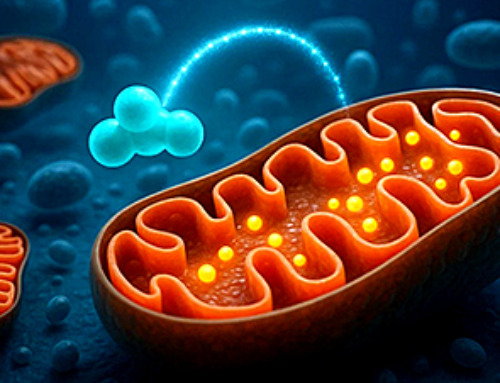Researchers in Bonn examine how treatment with tetrahydrocannabinol affects the mTOR metabolic pathway.
A low-dose, long-term administration of cannabis has been shown to not only reverse aging processes in the brain but also exhibit anti-aging effects. Researchers from University Hospital Bonn (UKB) and the University of Bonn, in collaboration with a team from Hebrew University in Israel, demonstrated this effect in mice.
The key to this discovery lies in the protein switch mTOR, which influences cognitive performance and metabolic processes throughout the body. These findings have been published in the journal ACS Pharmacology & Translational Science.
Information about the availability or scarcity of resources is of crucial importance for the regulation of metabolism. The so-called metabolome is a complex reaction network that summarizes all metabolic properties of a cell or tissue. In higher organisms, the protein mTOR [Mechanistic Target of Rapamycin] is the central hub for cell growth and metabolism.

As a sensitive intracellular energy sensor system, its activity has a major influence on aging by regulating cell metabolism. A reduction in mTOR activity through a low-calorie diet, intensive physical activity, or pharmacological treatment therefore has a general anti-ageing effect. In addition to an altered metabolism, the aging of the brain is also accompanied by a reduced ability to change neuronal connections, known as synaptic plasticity. Reduced mTOR activity can therefore also have a negative effect on the aging brain by reducing the formation of new synapses on a nerve cell and thus also cognitive abilities.
“Therefore, anti-aging strategies based on the reduction of mTOR activity might not only be ineffective but even counterproductive against brain aging. In our current work, we have now found a strategy to solve this dilemma,” says Prof. Dr. Andreas Zimmer, Director of the Institute of Molecular Psychiatry at the UKB and member of the Cluster of Excellence ImmunoSensation2 at the University of Bonn.
Cannabis reverses the aging process in the brain
In a previous study, the Bonn researchers, together with a team from the Hebrew University of Jerusalem, were able to show that long-term, low-dose administration of tetrahydrocannabinol (THC), the active ingredient in cannabis, has an anti-aging effect on the brain by restoring cognitive abilities and synapse density in old mice. Whether changes in mTOR signaling and the metabolome are linked to the positive effects on the aging brain has remained an open question.
“We have now been able to show that treatment with THC has a tissue-dependent and dual effect on mTOR signaling and the metabolome,” says Dr. Andras Bilkei-Gorzo from the Institute of Molecular Psychiatry at the UKB, who is also a researcher at the University of Bonn. Thus, THC treatment in the brain led to a transient increase in mTOR activity and levels of intermediates involved in energy production and amino acids. The latter enabled an increased synthesis of synaptic proteins and thus the formation of new synapses.
Unexpectedly, on the other hand, the Bonn researchers found a similarly strong reduction in mTOR activity of mice in adipose tissue and in the content of amino acids and carbohydrate metabolites in blood plasma as after a low-calorie diet or after intensive physical activity.
“We concluded that long-term THC treatment initially has a cognition-enhancing effect by increasing energy and synaptic protein production in the brain, followed by an anti-aging effect by decreasing mTOR activity and metabolic processes in the periphery,” says Bilkei-Gorzo. “Our study suggests that a dual effect on mTOR activity and the metabolome could be the basis for an effective anti-aging and cognition-enhancing drug.”
Reference: “Bidirectional Effect of Long-Term Δ9-Tetrahydrocannabinol Treatment on mTOR Activity and Metabolome” by Andras Bilkei-Gorzo, Britta Schurmann, Marion Schneider, Michael Kraemer, Prakash Nidadavolu, Eva C. Beins, Christa E. Müller, Mona Dvir-Ginzberg and Andreas Zimmer, 14 August 2024, ACS Pharmacology & Translational Science.
DOI: 10.1021/acsptsci.4c00002
This work was funded by the German Research Foundation and the German Excellence Strategy.
News
Breakthrough Drug Restores Vision: Researchers Successfully Reverse Retinal Damage
Blocking the PROX1 protein allowed KAIST researchers to regenerate damaged retinas and restore vision in mice. Vision is one of the most important human senses, yet more than 300 million people around the world are at [...]
Differentiating cancerous and healthy cells through motion analysis
Researchers from Tokyo Metropolitan University have found that the motion of unlabeled cells can be used to tell whether they are cancerous or healthy. They observed malignant fibrosarcoma cells and [...]
This Tiny Cellular Gate Could Be the Key to Curing Cancer – And Regrowing Hair
After more than five decades of mystery, scientists have finally unveiled the detailed structure and function of a long-theorized molecular machine in our mitochondria — the mitochondrial pyruvate carrier. This microscopic gatekeeper controls how [...]
Unlocking Vision’s Secrets: Researchers Reveal 3D Structure of Key Eye Protein
Researchers have uncovered the 3D structure of RBP3, a key protein in vision, revealing how it transports retinoids and fatty acids and how its dysfunction may lead to retinal diseases. Proteins play a critical [...]
5 Key Facts About Nanoplastics and How They Affect the Human Body
Nanoplastics are typically defined as plastic particles smaller than 1000 nanometers. These particles are increasingly being detected in human tissues: they can bypass biological barriers, accumulate in organs, and may influence health in ways [...]
Measles Is Back: Doctors Warn of Dangerous Surge Across the U.S.
Parents are encouraged to contact their pediatrician if their child has been exposed to measles or is showing symptoms. Pediatric infectious disease experts are emphasizing the critical importance of measles vaccination, as the highly [...]
AI at the Speed of Light: How Silicon Photonics Are Reinventing Hardware
A cutting-edge AI acceleration platform powered by light rather than electricity could revolutionize how AI is trained and deployed. Using photonic integrated circuits made from advanced III-V semiconductors, researchers have developed a system that vastly [...]
A Grain of Brain, 523 Million Synapses, Most Complicated Neuroscience Experiment Ever Attempted
A team of over 150 scientists has achieved what once seemed impossible: a complete wiring and activity map of a tiny section of a mammalian brain. This feat, part of the MICrONS Project, rivals [...]
The Secret “Radar” Bacteria Use To Outsmart Their Enemies
A chemical radar allows bacteria to sense and eliminate predators. Investigating how microorganisms communicate deepens our understanding of the complex ecological interactions that shape our environment is an area of key focus for the [...]
Psychologists explore ethical issues associated with human-AI relationships
It's becoming increasingly commonplace for people to develop intimate, long-term relationships with artificial intelligence (AI) technologies. At their extreme, people have "married" their AI companions in non-legally binding ceremonies, and at least two people [...]
When You Lose Weight, Where Does It Actually Go?
Most health professionals lack a clear understanding of how body fat is lost, often subscribing to misconceptions like fat converting to energy or muscle. The truth is, fat is actually broken down into carbon [...]
How Everyday Plastics Quietly Turn Into DNA-Damaging Nanoparticles
The same unique structure that makes plastic so versatile also makes it susceptible to breaking down into harmful micro- and nanoscale particles. The world is saturated with trillions of microscopic and nanoscopic plastic particles, some smaller [...]
AI Outperforms Physicians in Real-World Urgent Care Decisions, Study Finds
The study, conducted at the virtual urgent care clinic Cedars-Sinai Connect in LA, compared recommendations given in about 500 visits of adult patients with relatively common symptoms – respiratory, urinary, eye, vaginal and dental. [...]
Challenging the Big Bang: A Multi-Singularity Origin for the Universe
In a study published in the journal Classical and Quantum Gravity, Dr. Richard Lieu, a physics professor at The University of Alabama in Huntsville (UAH), which is a part of The University of Alabama System, suggests that [...]
New drug restores vision by regenerating retinal nerves
Vision is one of the most crucial human senses, yet over 300 million people worldwide are at risk of vision loss due to various retinal diseases. While recent advancements in retinal disease treatments have [...]
Shingles vaccine cuts dementia risk by 20%, new study shows
A shingles shot may do more than prevent rash — it could help shield the aging brain from dementia, according to a landmark study using real-world data from the UK. A routine vaccine could [...]





















